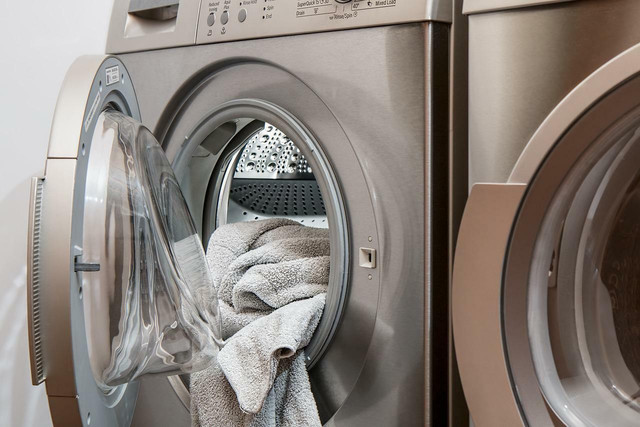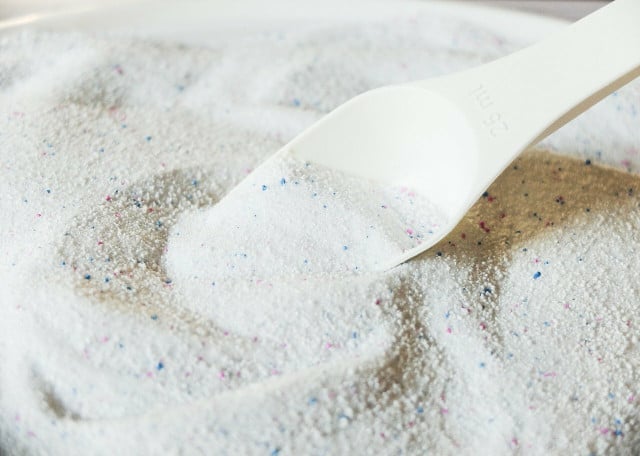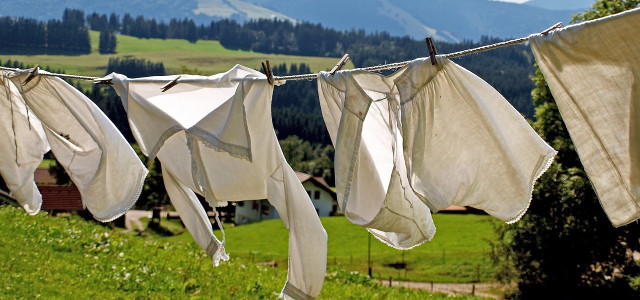If you don’t know which ingredients are in it exactly, you might be wondering whether fabric softener is bad for you — or the environment. Here is everything you need to know.
Fabric softener is used to reduce wrinkles, soften and freshen up clothing, and to reduce static. Despite these qualities the ingredients in your fabric softener may not be great for the environment or your health.
Is Fabric Softener Bad? A Look at the Ingredients
What makes up fabric softener and is it bad for the environment? Most softeners are made up of a variety of different chemicals referred to as cationic surfactants. They all have a positively charged nitrogen atom as well as a hydrophobic compound, which gives them their fabric-softening and antistatic properties. They can be the active ingredient in the fabric softeners:
- Alkyltrimethylammonium salts
- Dialkyldimethylammonium salts
- Alkyldimethylbenzylammonium salts
- Alkyl ester ammonium salts
By volume, the last group of alkyl ester ammonium salts is the most important cationic surfactant.
Although certain chemicals in softeners are readily biodegradable, there are ingredients, namely petroleum-based chemicals, that have no biodegradability at all. Thus, softeners are bad for the environment when runoff occurs because they take a long time to leave the ecosystem, if at all. If washed down any drains these chemicals can negatively affect aquatic ecosystems. According to the Danish Environmental Protection Agency, organisms like algae and all fish are very sensitive to these cationic surfactants. These chemicals run off into the ocean from drains and harm the life inside because of algae blooms which release toxins and reduce oxygen for all marine life.
Fabric Softener: Smells Good, Does Bad

(Foto: CC0 / Pixabay / stevepb)
Fragrances
According to a study by Washington University, buying products with fragrance in them can be dangerous because companies are not required to disclose all potential harmful ingredients inside and often do not: they found 100 volatile organic compounds emitted from six products. These VOCs are very dangerous for the health of the environment and people: they can cause irritation to the eyes, nose, and throat; headaches and the loss of coordination; nausea; and damage to the liver, kidneys, or central nervous system. They were not listed on any product label and five of the six products emitted one or more carcinogenic hazardous air pollutant. The authors of the study recommend to consumers non-fragrance options for fabric softener, if you use it at all, because the of the unique and dangerous 3,000 chemicals that can be used to fabricate a scent without the legal requirement to list it.
Local Health
Another adverse effect of fragrance is the effect on local community. When using a dryer, the fragrance from sheets and the softener can be released into the air. Using dryer racks instead of a dryer is better for both the environment and the neighborhood for anyone sensitive to these fragrance chemicals. These fragrances can cause allergies, dermatitis, difficulty in respiratory and reproductive systems even when these are vented outdoors.
Consumer Health
Fabric softener can have negative effects on your health because of the chemical composition in softeners and the unique fragrance chemicals. A study showed that a considerable percentage of the U.S. population reports adverse health effects or irritation from fragranced products, with higher percentages among those with asthma and chemical sensitivity.
Natural Alternatives to Fabric Softener



(Foto: CC0 / Pixabay / habelfrank)
For ways to make your own organic alternatives to fabric softener check out our overview “All-Natural Homemade Fabric Softener” or use one of our 10 eco-friendly substitutes for fabric softener.
These alternatives to fabric softener include:
- Baking soda and vinegar
- Wool dryer balls
- Clean tennis ball
- Water and vinegar and hair conditioner
Read more:
- Make Your Own Laundry Detergent in 6 Steps
- Washing Clothes with Vinegar: Benefits of Adding Vinegar to Laundry
- Citric Acid for Cleaning: Practical Household Uses
Do you like this post?






